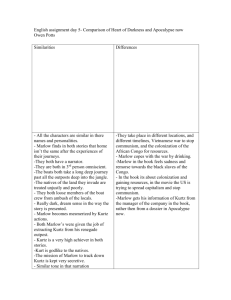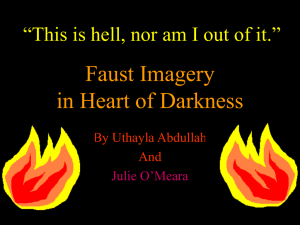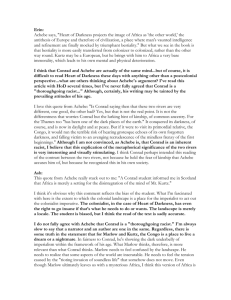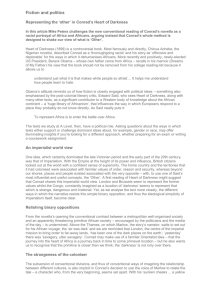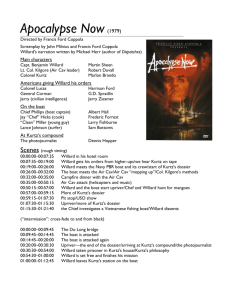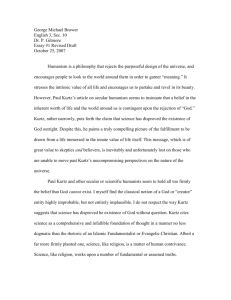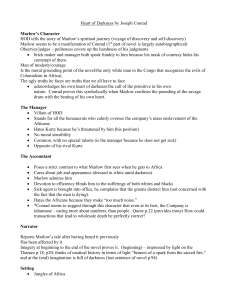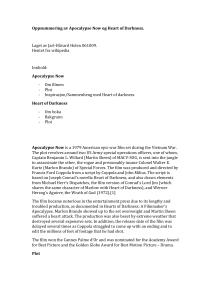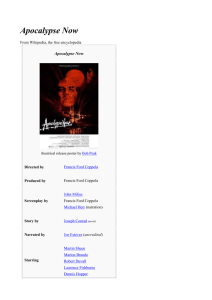Study Guide 1 to Conrad`s *Heart of Darkness* and Coppola`s
advertisement
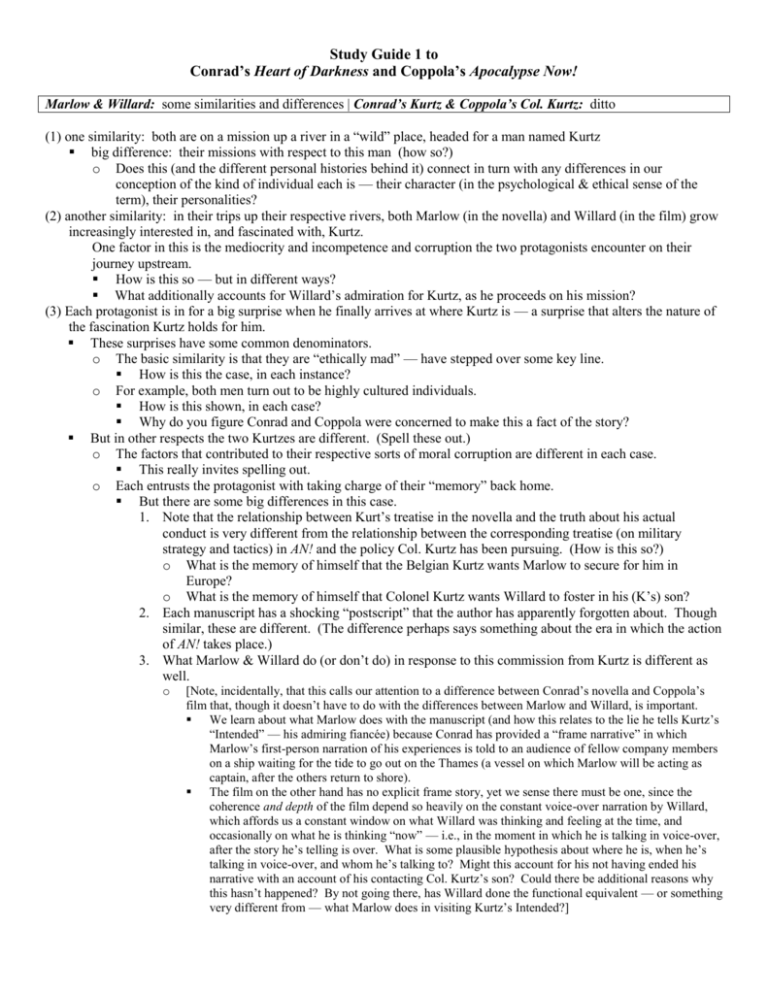
Study Guide 1 to Conrad’s Heart of Darkness and Coppola’s Apocalypse Now! Marlow & Willard: some similarities and differences | Conrad’s Kurtz & Coppola’s Col. Kurtz: ditto (1) one similarity: both are on a mission up a river in a “wild” place, headed for a man named Kurtz big difference: their missions with respect to this man (how so?) o Does this (and the different personal histories behind it) connect in turn with any differences in our conception of the kind of individual each is — their character (in the psychological & ethical sense of the term), their personalities? (2) another similarity: in their trips up their respective rivers, both Marlow (in the novella) and Willard (in the film) grow increasingly interested in, and fascinated with, Kurtz. One factor in this is the mediocrity and incompetence and corruption the two protagonists encounter on their journey upstream. How is this so — but in different ways? What additionally accounts for Willard’s admiration for Kurtz, as he proceeds on his mission? (3) Each protagonist is in for a big surprise when he finally arrives at where Kurtz is — a surprise that alters the nature of the fascination Kurtz holds for him. These surprises have some common denominators. o The basic similarity is that they are “ethically mad” — have stepped over some key line. How is this the case, in each instance? o For example, both men turn out to be highly cultured individuals. How is this shown, in each case? Why do you figure Conrad and Coppola were concerned to make this a fact of the story? But in other respects the two Kurtzes are different. (Spell these out.) o The factors that contributed to their respective sorts of moral corruption are different in each case. This really invites spelling out. o Each entrusts the protagonist with taking charge of their “memory” back home. But there are some big differences in this case. 1. Note that the relationship between Kurt’s treatise in the novella and the truth about his actual conduct is very different from the relationship between the corresponding treatise (on military strategy and tactics) in AN! and the policy Col. Kurtz has been pursuing. (How is this so?) o What is the memory of himself that the Belgian Kurtz wants Marlow to secure for him in Europe? o What is the memory of himself that Colonel Kurtz wants Willard to foster in his (K’s) son? 2. Each manuscript has a shocking “postscript” that the author has apparently forgotten about. Though similar, these are different. (The difference perhaps says something about the era in which the action of AN! takes place.) 3. What Marlow & Willard do (or don’t do) in response to this commission from Kurtz is different as well. o [Note, incidentally, that this calls our attention to a difference between Conrad’s novella and Coppola’s film that, though it doesn’t have to do with the differences between Marlow and Willard, is important. We learn about what Marlow does with the manuscript (and how this relates to the lie he tells Kurtz’s “Intended” — his admiring fiancée) because Conrad has provided a “frame narrative” in which Marlow’s first-person narration of his experiences is told to an audience of fellow company members on a ship waiting for the tide to go out on the Thames (a vessel on which Marlow will be acting as captain, after the others return to shore). The film on the other hand has no explicit frame story, yet we sense there must be one, since the coherence and depth of the film depend so heavily on the constant voice-over narration by Willard, which affords us a constant window on what Willard was thinking and feeling at the time, and occasionally on what he is thinking “now” — i.e., in the moment in which he is talking in voice-over, after the story he’s telling is over. What is some plausible hypothesis about where he is, when he’s talking in voice-over, and whom he’s talking to? Might this account for his not having ended his narrative with an account of his contacting Col. Kurtz’s son? Could there be additional reasons why this hasn’t happened? By not going there, has Willard done the functional equivalent — or something very different from — what Marlow does in visiting Kurtz’s Intended?]
